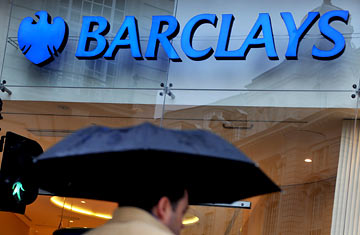
A pedestrian passes a Barclays bank branch in London
It's a measure of the havoc wreaked on the world's banking system in recent months that the words chosen by bank bosses to convey the health of their business have lost all relative meaning. Victor Blank, chairman of Lloyds Banking Group, saw "exciting prospects for the group" in its first-half results unveiled Wednesday, Aug. 5. Northern Rock "is making progress," chief executive Gary Hoffman said of the British bank's half-year results announced a day earlier. "Our first-half performance," Barclays boss John Varley reckoned the day before that, was "a good start." At HSBC, chief exec Michael Geoghegan said Monday, the first six months of the year "saw much that is encouraging for our future."
In other words, improvement means different things to different bank bosses. Mounting bad debt at Lloyds drove it to a $6.8 billion loss in the first half of this year, some distance from the $4.8 billion profit recorded in the same six months of 2008. Northern Rock, nationalized early last year after a run on its deposits in 2007, slumped to a pretax loss of $1.2 billion in the first half, far worse than the $984 million shortfall recorded in the same period of 2008. A stellar six months at the investment-banking unit of London-based HSBC, meanwhile, helped prop up its falling profits. Income across Europe's largest bank fell to $5 billion, half the level hit a year earlier. At Barclays, the U.K.'s second-biggest lender, profits rose 8%, to $5 billion.
Of course, as institutions emerging from the worst of the credit crisis, the banks have little more than that in common. Famous for flogging mortgages worth 125% of a property's value, Newcastle-based Northern Rock was caught with its pants down when the wholesale markets it relied on to fund those loans froze in 2007. With unemployment rising and house prices still on the wane, the bank's impairment charges for soured loans tripled, to $1 billion in the first half of this year vs. the same period in 2008. Just as worrying: a shade under 4% of its home loans were more than three months in arrears, the company said Tuesday. (The average across Britain's banks is 2.4%.) Plans to split the bank into its "good" and "bad" halves — savers' deposits and new lending in the former, existing loans in the latter, as a prelude to reprivatization — still await the E.U.'s stamp of approval.
While there's no such trouble at HSBC or Barclays, Monday's interim results presented challenges of a different kind. Both lenders leaned heavily on lucrative investment-banking units to soften the blow from bad debts in the commercial or retail arms of the groups. Owing in part to its purchase last fall of Lehman Brothers' U.S. operations, profits at Barclays Capital doubled in the first half of the year, to $1.7 billion. The group's charges for bad debt, meanwhile, leaped by a similar rate, to some $7.7 billion. Vital to the bank in coming years: reducing its reliance on highly cyclical investment banking by boosting the share of income from commercial and retail operations.
In their efforts to expand, going without government bailouts during the depths of the crisis last fall won't have done either bank's prospects any harm. While Barclays and HSBC have both benefited from taxpayer loans or guarantees — part of a $2 trillion package of state and central-bank aid doled out to Britain's lenders — both "have worked hard on their balance sheets," says Simon Maughan, a banking analyst at MF Global brokerage in London. Having tapped Middle East investors last year in an effort to bolster its capital base, Barclays agreed in June to sell the investment unit BGI to U.S. fund manager BlackRock for $13 billion. HSBC, for its part, pulled in close to $18 billion in a bumper-rights issue in April. The result: "Survival is no longer the issue" for these banks, says Maughan. "Growth can be once again."
For others, meanwhile, the prospects may not be so bright. Impairments at Lloyds rose to $22.8 billion in the first half, the company said Wednesday, thanks largely to its acquisition in January of HBOS, the troubled U.K. lender heavily exposed to Britain's declining property market. Still, you can't fault Lloyds' optimism. The bank, in which the government has a 43% stake, predicted "high single-digit income growth" within two years. Analysts expect a steep hike in provisions for bad loans when Royal Bank of Scotland (RBS), Britain's largest taxpayer-funded lender, unveils first-half results later this week. After falling to a $40 billion loss last year, the largest in U.K. corporate history, RBS — more than two-thirds of it in government hands — should at least break even this time around, Maughan reckons. At the very least, it will be another report of improvement.
